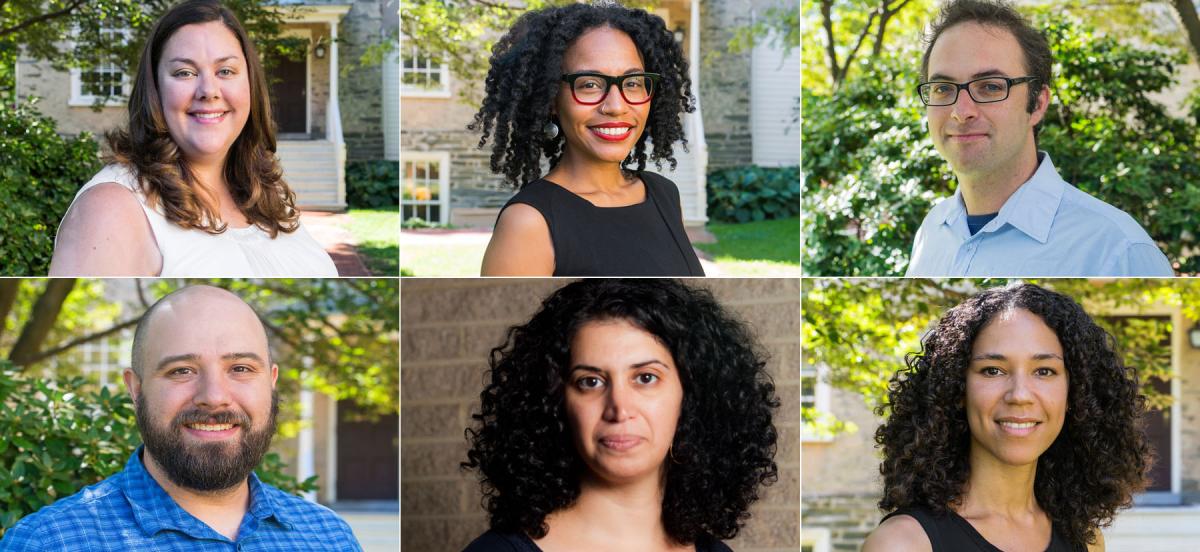Six New Assistant Professors Join The Haverford Faculty

(From left, top) Kristen Whalen, Juli Grisby, Daniel Grin, (bottom) Theodore Brzinski, Zainab Saleh, Christina Knight. Photos by Patrick Montero.
Details
This fall, the College welcomed new faculty members in the departments of anthropology, biology, physics, and visual studies.
Joining the Department of Anthropology is Juli Grigsby, who received her Ph.D. in cultural anthropology with a focus on African diaspora and gender studies from the University of Texas at Austin. Before coming to Haverford, she was a postdoctoral research fellow in the Africana Research Center and the Department of Women’s, Gender, and Sexuality Studies at Pennsylvania State University. Her research is primarily in the areas of race, gender, and U.S. social movements, with a focus on reproductive health and violence, and she is turning her dissertation, titled Grim Sleeper: Gender, Violence, and Reproductive Justice in Los Angeles, into a full-length book manuscript. The book examines the case of a serial killer who targeted black women in Los Angeles from 1985 to 2010. Some of the anthropology courses Grigsby will be teaching at Haverford will contribute to the interdisciplinary minor in health studies, and the concentrations in Africana and African studies, and gender and sexuality studies.
The anthropology department also welcomes Zainab Saleh, who studied at Baghdad University and the American University of Beirut in Lebanon before earning her doctorate in anthropology at Columbia University. She was previously a postdoctoral fellow in Arab studies at the University of California, Berkeley, and first joined the Haverford community as the 2011–13 Mellon Postdoctoral Fellow at the Hurford Center for the Arts and Humanities. Saleh’s research interests in cultural anthropology focus on diaspora and exile, violence, memory, and the Middle East. Her book manuscript, Inhabiting Destruction: Exile, Political Subjectivity, and the Iraqi Diaspora, examines the impact of the U.S. occupation of Iraq on the Iraqi community in London. Some of the courses she will teach will be cross-listed with Middle East and Islamic studies and gender and sexuality studies, thus supporting those concentrations.
Joining the Department of Biology is Kristen Whalen, who earned her Ph.D. in biological oceanography at the Massachusetts Institute of Technology/Woods Hole Oceanographic Institution. Before coming to Haverford, she served as a National Science Foundation (NSF) research associate, and was an NSF postdoctoral fellow at Woods Hole. Whalen is a biochemist who uses an integrative approach, combining molecular, cellular, biochemical, and metabolomic techniques, to understand the molecular and biochemical adaptations that marine organisms employ to cope with chemical threats in their environment. She also isolates marine-organism natural products, which are essential in mediating microbe-microbe interaction, and serving as templates for the development of possible chemotherapeutics to treat human disease. Whalen's drug discovery program will be supported by significant funding from the National Institutes of Health. In addition to her research lab in Sharpless Hall, Whalen will be setting up a sea-urchin facility in the Koshland Integrated Natural Sciences Center. Some of her courses will contribute to the interdisciplinary minor in environmental studies and the biochemistry concentration.
Physics welcomes Theodore (Ted) Brzinski, who pursued his doctoral studies at the University of Pennsylvania in physics and astronomy, investigating granular and soft condensed matter physics. He was previously a postdoctoral fellow at North Carolina State University studying acoustic properties of granular materials and seismicity. In his research, Brzinski studies sand and sediment granular particles to better understand the rheology, mechanics, interparticle interactions, flow and acoustics from one single particle up to billions of particles. This research is seminal in understanding how large numbers of particles behave together, and has far-reaching implications into the study of how sand and sediment move during landslides and earthquakes. He will be teaching at all levels of the physics curriculum and will be supervising senior research in experimental physics. Some of his courses will contribute to the interdisciplinary minor in environmental studies.
The physics department also welcomes Daniel Grin, who received his Ph.D. in astrophysics from the California Institute of Technology. Previously, Grin was an NSF astronomy and astrophysics postdoctoral fellow and an associate fellow at the Kavli Institute for Cosmological Physics at the University of Chicago. Prior to that, he was a three-year postdoctoral member at the Institute for Advanced Study, in Princeton, NJ. Grin is a theoretical physicist who studies early-universe cosmology, hydrogen recombination, cosmic microwave background spectrum and anisotropies, dark matter, gravitational waves, dark energy, and neutrinos. He has also been involved in outreach activities, organizing a series of astrophysics lectures for older-adult enrichment in the Chicago area and serving as an instructor in the Princeton Prison Teaching Initiative. He will be teaching at all levels of the physics curriculum and will be supervising senior research in theoretical and computational physics. Some of his courses will contribute to the concentration in scientific computing.
Finally, Christina Knight joins the faculty as an assistant professor of visual studies. Knight earned her Ph.D. at Harvard University in African American studies with a primary focus on the history of art and architecture. During her graduate career, she was a traveling scholar at the Institute for Research in African American Studies at Columbia University. The title of her dissertation is Performing Passage: Contemporary Artists Stage the Slave Trade, which she is developing into a book manuscript. Her research looks at the intersection of contemporary black American performing and visual arts and the history of slavery. She will teach courses in Africana and African studies, as well as courses on visual studies. In collaboration with Haverford colleagues, she will be one of the key architects working to build the visual studies curricular and scholarly programs, and she will serve a significant role in developing programming between the new Visual Culture, Arts, and Media (VCAM) and the Hurford Center for the Arts and Humanities.



